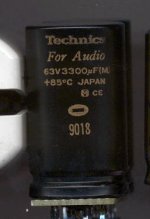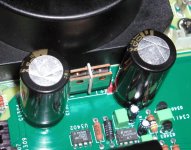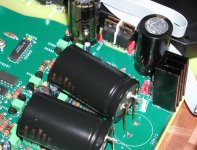That aluminum fear (alumiphobia?) was based on some research that linked the metal with Alzheimer's disease. I think that it has been questioned for some time. I remember throwing out some aluminum pans in the 70's based on these assocations. Ever cook tomato sauce in an aluminum pan? The result is a chemically polished pan (and micro-garnet spaghetti sauce). NIH says it's still an open question but does not recommend long term exposure.
I think to build stuff like Peter does, you got to breath a little aluminum occasionally.
After all, you have to die from something!
I think to build stuff like Peter does, you got to breath a little aluminum occasionally.
After all, you have to die from something!
Your right, you will die from something.
If its not from the Aluminum dust it will probabably be from a car hitting you while you are crossing the street while day dreaming about how Peter makes such nice equipment.
Scott
If its not from the Aluminum dust it will probabably be from a car hitting you while you are crossing the street while day dreaming about how Peter makes such nice equipment.
Scott
Speaking of metal... I worked in a hand pour brass foundry one summer while attending college. (Foundries will certainly underscore the importance of a good education.) In addition to the open furnaces that take on the look of a blue green afterburner at pour temperature, you have the flux addition (big outgas) and, my favorite, grinding the parting lines. Mr. Lentz, the owner was a fifty year veteran of this poisonous environment. He had the "copper shakes" so bad he couldn't pick his nose without poking his eye. His signature on our checks clearly demonstrated that long term exposure.
The worst IMHO, MDF, Teak, Oak, and the grand prize winner, removing marine bottom paint. Truly a witch's brew of heavy metals and biocide.
The worst IMHO, MDF, Teak, Oak, and the grand prize winner, removing marine bottom paint. Truly a witch's brew of heavy metals and biocide.
Everything is toxic. Live your life without taking stupid risks but dont stop living because you are afraid of everything causing some disease. I live in Los Angeles, the air is toxic so everything else is just gravy!
chipco3434 said:That aluminum fear (alumiphobia?) was based on some research that linked the metal with Alzheimer's disease. I think that it has been questioned for some time. I remember throwing out some aluminum pans in the 70's based on these assocations. Ever cook tomato sauce in an aluminum pan? The result is a chemically polished pan (and micro-garnet spaghetti sauce). NIH says it's still an open question but does not recommend long term exposure.
AFAIK, abnormal presence of Al in the cells of persons having Alzheimer's has been pointed out, but latest news say that it is not related to particular Al absorption, but rather to a misfunction of Al elimination by the cells due to the disease itself....
BTW, Peter, just one word : WooooooooooooooooooooooooowwwwwwwwwwwwwwwAaaaaaaarrrrrrrggggggghhhhh !
Re: Health risks in machining aluminum?
Dry sanding and grinding of any metal is definitely a health issue and should be avoided. All metal dust is a serious problem. If it cant be avoided, heavy ventiltion should be used.
Magura🙂
KT said:After reading about how you made your fabulous knob, I have just a quick question to you and any other machinists about working with aluminum: are there any health risks in drilling, milling, or sanding aluminum that we should be aware of?
Dry sanding and grinding of any metal is definitely a health issue and should be avoided. All metal dust is a serious problem. If it cant be avoided, heavy ventiltion should be used.
Magura🙂
I did some mods today, and the change in a preamp is quite amazing.
First, I replaced stock bridges. In digital section I used MSR860 diodes and in analog section, MUR860. I also tried BYV28-100. Although the latter were not bad, they somehow presented more flat soundstage and were slightly bright. MUR860 provided more natureal sound, more 3D and more involvement.
I also replaced original regulators, 78xx type, for low dropout type (from National), used in 38 to 380 upgrade.
Those two mods made the preamp to open up, and the lack of highs extention wasn't as noticable as previously. It actually started to sound pretty good.
Next thing I did, was changing the caps. After the bridges, there are two caps in parallel: 2,200/35 and 6,800/35. I replaced the first one with BG F 1000/35 and the second one with Panasonic For Audio cap (3,300/63V). I removed those caps from Technics CD player (guess one of the better ones, as it was CAD $8,000 in 1991). I also replaced 68u/63V cap (located right after regulator) with 4.7BG N.
Well, changing those caps made the preamp to sound completely different. Dark character is gone, there is extention in the highs with lots of air, the pace and rhytm are very presentable and the detail is amazing. The sound is very fast and you can easily concentrate on any specific instrument without being distracted by other sounds.
I see lots of potential in this preamp now and I think it already improves the sound of the amp. The sound seems to be better with the preamp, than when using passive attenuator. And there are still so many mods to perform😉
Here's a pic of the Panasonic cap. It is one of the few caps that comes originally without plastic sleeve, it is just painted black. I new right away that it may be good😉
First, I replaced stock bridges. In digital section I used MSR860 diodes and in analog section, MUR860. I also tried BYV28-100. Although the latter were not bad, they somehow presented more flat soundstage and were slightly bright. MUR860 provided more natureal sound, more 3D and more involvement.
I also replaced original regulators, 78xx type, for low dropout type (from National), used in 38 to 380 upgrade.
Those two mods made the preamp to open up, and the lack of highs extention wasn't as noticable as previously. It actually started to sound pretty good.
Next thing I did, was changing the caps. After the bridges, there are two caps in parallel: 2,200/35 and 6,800/35. I replaced the first one with BG F 1000/35 and the second one with Panasonic For Audio cap (3,300/63V). I removed those caps from Technics CD player (guess one of the better ones, as it was CAD $8,000 in 1991). I also replaced 68u/63V cap (located right after regulator) with 4.7BG N.
Well, changing those caps made the preamp to sound completely different. Dark character is gone, there is extention in the highs with lots of air, the pace and rhytm are very presentable and the detail is amazing. The sound is very fast and you can easily concentrate on any specific instrument without being distracted by other sounds.
I see lots of potential in this preamp now and I think it already improves the sound of the amp. The sound seems to be better with the preamp, than when using passive attenuator. And there are still so many mods to perform😉
Here's a pic of the Panasonic cap. It is one of the few caps that comes originally without plastic sleeve, it is just painted black. I new right away that it may be good😉
Attachments
Hi Peter, thanks for the advice. Any pics of the modded pcb to show us? I never really liked the idea of op-amps over discrete circuits but seems your great work has fueled my enthusiasm again!
ps. thought Al poisoning causes Parkinson's disease, like what happened to Michael J Fox drinking diet pepsi....
ps. thought Al poisoning causes Parkinson's disease, like what happened to Michael J Fox drinking diet pepsi....
Peter, how about trying some standard panasonic FC instead of these fancy schmunzy audiocaps. I suspecy it was the smaller caps rather than the brand to do it for you, it would be good info to know whether it was so. Or maybe it was the way you attached the caps. 😉
It may be the smaller size, as I'm noticing it all the time that smaller caps just make it sound better: faster and better presence and detail.
But also BG N caps are in a totally different league altogether and they may be doing something here too.
But I would recommend to everybody, don't use more capacitance that is necessary😉
But also BG N caps are in a totally different league altogether and they may be doing something here too.
But I would recommend to everybody, don't use more capacitance that is necessary😉
Only the output bufffer is discreet (SSM2210/2220), otherwise OPA2604 are used for I/V conversion (volume is done through a DAC) and for input buffer.
For IC preamp, it all sounds very good.
For IC preamp, it all sounds very good.
- Home
- Amplifiers
- Solid State
- Building Mark Levinson 38 preamp chassis from scratch






